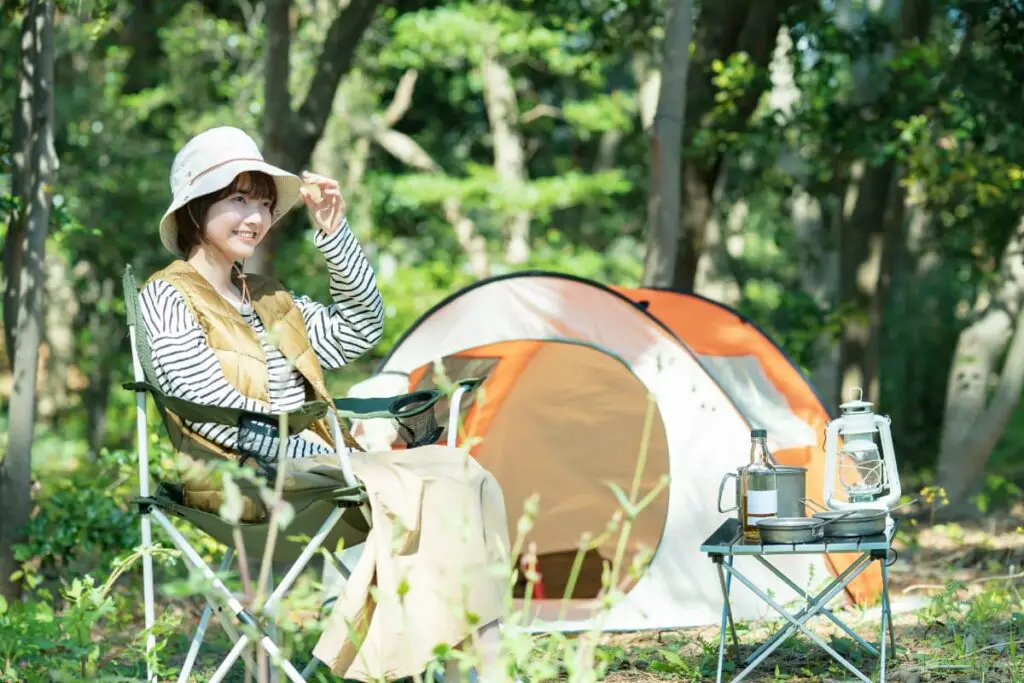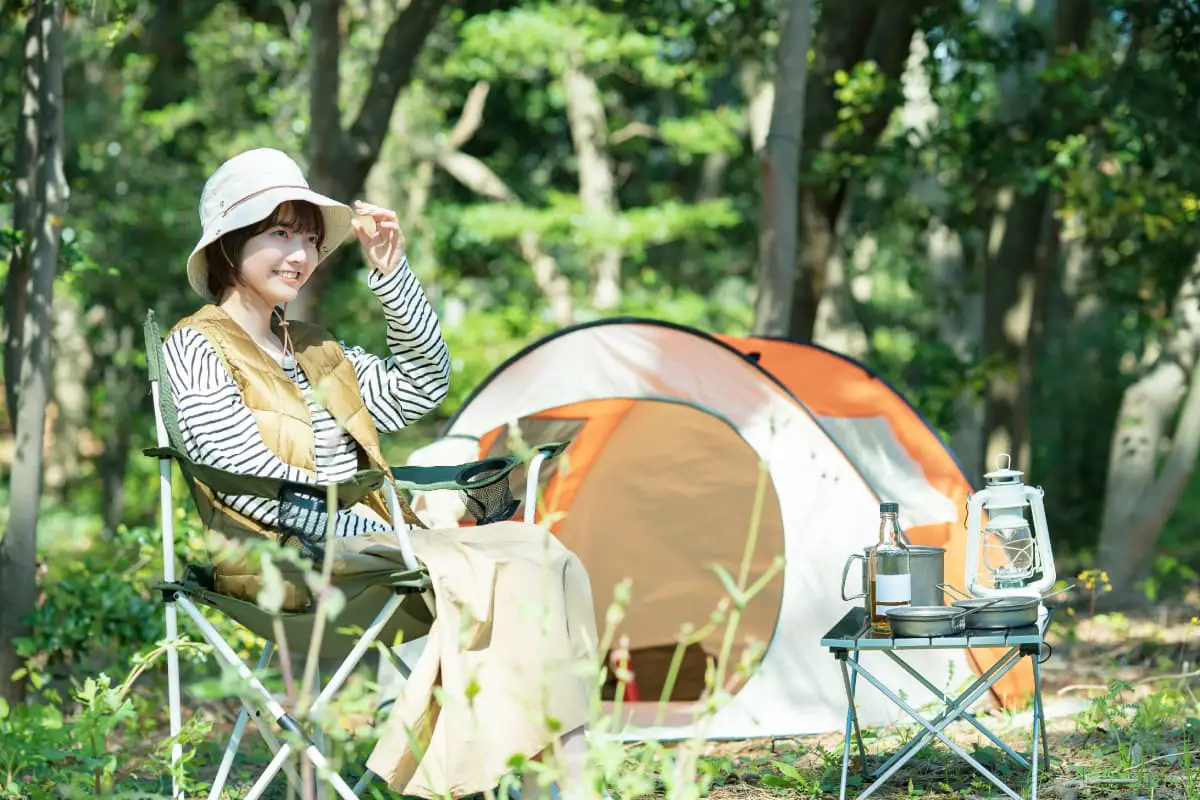As humans are social by nature, solo camping trips sound intimidating. All responsibilities associated with camping are left up to you, and you’re alone for the duration of the trip. Not only that, but you’re tasked with entertaining yourself as well.
Solo camping isn’t boring. You’ll find a new sense of independence, reconnect with nature, and experience free natural entertainment. Camping alone means learning new skills, rediscovering yourself, observing wildlife, exploring your surroundings, and fully immersing yourself in the experience.
This article explains what you need to know about solo camping, why it’s fun, and how it benefits you. Additionally, the article touches on several tips for camping alone to ensure your safety, put your mind at ease, and allow yourself to enjoy yourself to the fullest. Read on to learn more.

Things To Know About Solo Camping and Why It’s So Exciting
When people think of camping alone , the first thing that comes to mind is boredom. Interestingly, that should be the last thing a person worries about when camping without the company of others.
, the first thing that comes to mind is boredom. Interestingly, that should be the last thing a person worries about when camping without the company of others.
Solo camping isn’t for the faint of heart — it’s an adventure. This adventure requires basic survival skills and the mental ability to remain alone for however long you’re camping. Though it may not sound like a challenging feat, humans are incredibly social, relying on each other for survival and mental well-being, from food production to emotional support.
Needless to say, spending even a night alone in the wilderness can do things to the mind that one wouldn’t expect — fortunately, many of those are positive things.
Let’s look at some of the positive aspects of solo camping and why it’s so exciting.
1. You’ll Experience a New Found Sense of Independence
When camping alone , there’s no delegation of tasks — everything is up to you. You’re required to set up camp, gather kindling for the campfire, and entertain yourself. Therefore, as you take part in this solo journey, you’ll not only learn more about the camping experience, which increases your skills for future trips, but you’ll also learn more about yourself.
, there’s no delegation of tasks — everything is up to you. You’re required to set up camp, gather kindling for the campfire, and entertain yourself. Therefore, as you take part in this solo journey, you’ll not only learn more about the camping experience, which increases your skills for future trips, but you’ll also learn more about yourself.
Learning about the inner workings of your mind is hardly ever boring.
Considering that we, as humans, are social creatures , you’re likely to feel out of your comfort zone at least once during your solo camping session. However, this feeling is exactly what pushes you to enjoy a new sense of independence and self-confidence.
, you’re likely to feel out of your comfort zone at least once during your solo camping session. However, this feeling is exactly what pushes you to enjoy a new sense of independence and self-confidence.
When in social groups, we are consciously aware of what others think, but when in nature, we can truly be ourselves and relax a little. The soil, trees, and wildlife aren’t there to judge — they have no cares about your struggles to start a fire or your ability to tie a shoelace knot. This is precisely why nature is a huge confidence booster.
If you’re performing a task that you’re uncomfortable with, you can make mistakes without worrying about anyone else. And once you achieve what you set out to do, you can celebrate your victory with as much enthusiasm as you’d like without strange stares.
At night, as you sit around the fire preparing for bed and the moonlight reflects off of your mug of hot chocolate — the fire that you started, with kindling that you gathered, drinking cocoa that you made — you’re likely to look at the world a little differently.
2. You’ll Reconnect with Nature
Embarking on a solo camping adventure means temporarily leaving behind the mindless conversations and tasks that hold us down. At last, you’ll feel as though you’re back to your true natural roots — and there’s nothing boring about the natural world around us.
While setting up camp, take note of the soft, dewy ground beneath your feet and the smell of damp earth and decomposing leaves. Listen to the rustling of leaves as squirrels, chipmunks, and marmots scurry about gathering food. Feel the cool breeze against your flesh, and watch as the birds flutter by, heading back to the nest to care for their young.
At night, as you warm yourself by the fire, observe the flames as they dance with the gentle force of the wind. Listen as the owls hoot, tree frogs croak, and coyotes howl. Glance up toward the heavens to view the dazzling twinkle of stars without the impedance of light pollution .
.
These seemingly simple experiences can have a profound impact on your psyche and how you view the world.
People often describe the forest as lonely, but the truth is, there is so much life and beauty in the wilderness. Solo time spent in nature is a reminder that we’re smaller than we think, yet, despite our nominal size, we have an astonishing effect on the world around us.
3. Nature is Free Entertainment
People who believe that nature is boring haven’t fully immersed themselves in the excitement of the wild world around them.
When venturing into a solo camping excursion , consider bringing a drawing pad to sketch nature scenes or wildlife that inspire you. If you’re more into the written word, bring a journal to document the feelings, sights, smells, and sounds you experience.
, consider bringing a drawing pad to sketch nature scenes or wildlife that inspire you. If you’re more into the written word, bring a journal to document the feelings, sights, smells, and sounds you experience.
To fully immerse yourself, bring a pair of binoculars to safely view wildlife from a distance. Bring along a local wildlife guide or bird-watching book to get more information on the species you witness. For nighttime entertainment, bring a compact telescope to view the stars.
In addition to having fun at your campsite, consider canoeing, kayaking, hiking, or mountain biking. These add additional excitement and mental stimulation to the trip.
Electronics, such as smartphones, aren’t recommended, as they can take away from the authenticity of the solo camping experience. While it’s perfectly fine to bring one along for safety reasons, it’s best to keep it in a secure bag to allow yourself to relax and unwind without the daily reminder of work and responsibilities.
Tips for Camping Alone to Guarantee a Fun Experience
Before embarking on a solo camping adventure, there are a few things to keep in mind to ensure your safety and guarantee a fun experience.
Learn Basic Camping/Survival Skills First
Don’t assume that because you’ve camped at a campground before, you can handle a two-week solo camping trip in the vast wilderness with just a tent, water, and protein bars. Primitive camping requires experience, and camping alone requires even more experience.
Your best bet is to practice and work your way up to different camping challenges so that you’re not overwhelmed or putting yourself in danger once your true solo trip begins.
First, you should learn basic camping skills, including:
- Starting a fire
- Finding and/or creating clean water

- Choosing a location for camp
- Setting up camp
- Pitching a tent
- Handling encounters with wildlife
- Primitive weather forecasting
- First-aid and other remedies
- Basic navigation
Once you’ve mastered the basics, start with weekend trips to public campgrounds. Then, explore primitive camping sites with friends and family.
Before setting out on a fully solo trip in unknown territory, ensure that you’re unequivocally confident in your camping and survival skills, even if you were to end up lost or injured.
Practice Mindfulness and Anxiety Coping Skills
Being alone in the wilderness, though relaxing at times, can sometimes play tricks on the mind. Despite knowing with relative certainty that the boogeyman isn’t real, being alone in an unfamiliar area can cause the brain to turn every rustling bush, snapping twig, and scurrying animal into a mental image of Sasquatch — and fear can quickly suck the fun out of any situation.
Interestingly, when we experience fear , we often seek comfort in social settings. Obviously, when you’re alone, you do not have that option, so you must develop other ways to deal with stress and anxiety.
, we often seek comfort in social settings. Obviously, when you’re alone, you do not have that option, so you must develop other ways to deal with stress and anxiety.
The more acclimated you are to the sounds of nature, the more comfortable you become. Over time, you won’t jump at every bird flying overhead or every bug tapping on your tent.
In addition to embarking on solo camping trips more often, you can use mindfulness practices to your advantage when you’re feeling scared. Simply take a moment to identify sounds, sights, smells, tastes, and feelings in the moment to distract the mind from wandering or intrusive thoughts.
If you’re feeling intense fear, you should also read my guide on overcoming the fear of solo camping. I’ll share a few actionable tips to help you deal with those feelings. [How to Get Over the Fear of Solo Camping (XX Tips)]
Make Safety Your First Priority
When traveling, whether exploring a big city or camping in the vast wilderness, always let someone know where you’re going and when you expect to return. Never venture out into the forest without informing at least one trusted person.
That way, if you end up lost or injured, you know search and rescue will know you’re out there — and the comfort and security in knowing this goes a long way in reducing worry and allowing you to enjoy yourself a bit more.
Letting someone know your whereabouts also means not relying on a cell phone, which is a big deal, especially if the battery dies.
Finally, play it smart — don’t take risks. Move about slowly throughout the forest, don’t approach wildlife, and do your best to minimize the risk of injury.
Final Thoughts
Nature offers the most raw, unfiltered, authentic experiences that take us back to our primitive roots as a species. When you take the necessary steps to relax and fully immerse yourself in the natural environment around you, there’s no end to the entertainment you’ll find. What was once seemingly mundane becomes an unforgettable memory.
When you’re alone, it becomes even more magical. There’s no one to answer to. You can pace yourself. So, whether you wish to observe an inchworm for three hours or hike early enough to watch the sunrise over the mountain, the choice is yours.

